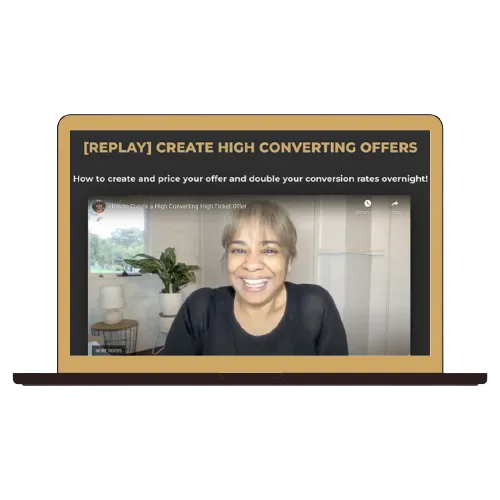Own Your Worth & Ditch Your Money Blocks to Build a Simple, Scalable & Sustainable Business
You Love
Want to Crack Your Income Code Based on Your Money Blueprint?
Own Your Worth, Ditch Your Money Blocks to Create a New Level of Freedom
Want to Crack Your Money Code and Achieve Your Ultimate Goals?










As a Business Mentor and Money Mindset Coach, I help coaches and consultants to build a simple, scalable and sustainable business they love.
I worked for 20 years in the corporate world and helped large organisations with business strategy.
I’ve also built a multi 7 figure business offline with my husband. We borrowed 300K against our home to start that business in 2008 and turned that into a million dollars in the first year. We’ve gone on to make over 50 million dollars in sales.
About 5 years ago, feeling the nudge to do something more, I started my coaching business. I already had a busy life, so I had to figure out how to build my second business working between 2-4 hours a day and as a result of achieving that, I now coach my clients on how to do the same.


As a Business Mentor and Money Mindset Coach, I help coaches, consultants and course creators to build a simple, scalable and sustainable business they love.
I worked for 20 years in the corporate world and helped large organisations with business strategy.
I’ve also built a multi 7 figure business offline with my husband. We borrowed 300K against our home to start that business in 2008 and turned that into a million dollars in the first year. We’ve gone on to make over 50 million dollars in sales.
Around 5 years ago, feeling the nudge to do something more, I started my coaching business. I already had a busy life, so I had to figure out how to build my coaching business working between 2-4 hours a day and as a result of achieving that, I now coach my clients on how to do the same.
As a result of figuring out how to package and position my value into a high ticket offer
I grew my business to 100K months in about 5 years, working less than 4 hours most days.
I've since shown many clients how to do the same.
I help my clients to create [or improve] a high ticket offer that is so good that it practically sells itself.
I coach them to authentically accelerate their authority; so they can take their prospects from cold to sold, fast.
We implement a predictable ORGANIC client acquisition strategy
that allows them to earn predictable income and bring in multiple 6 figures without hustling.
Because I figured out how to package and position my value into a high ticket offer
I grew my business to 100K months in about 5 years, working between 2-4 hours most days.
Now, I show my clients to do the same.
I help my clients to create [or improve] a high ticket offer that is so good that it practically sells itself.
I coach them to authentically accelerate their authority; so they can take their prospects from cold to sold, fast.
We implement a predictable ORGANIC client acquisition strategy
that allows them to earn predictable income and bring in multiple 6 figures
working less than 4 hours most days.

FREE 40 min Masterclass
Want to learn how to create and price your coaching offer
And also double your conversion rates overnight?

FREE 40 min Masterclass
Want to learn how to create and price your coaching offer
And also double your conversion rates overnight?

SEE MORE

Did you know 70% OF MY CLIENTS GET THEIR ROI in 30 days?
Yep. It's true and not common in the coaching industry.
See, I work with women STRIVING FOR 30-50K MONTHS…
And I know that regardless of what they think they need, there is a one-size-fits-all solution:
SIMPLIFICATION.
Now the thing is.... it’s really hard to do this on your own.
What needs to go?
What needs to stay?
How can you ACTUALLY do less and make more?
But with my help… it's entirely possible to shift to a simple, scalable, sustainable biz you love,
regardless of what your current business looks like.
Because maybe your business started out easy enough.
But then you added more offers.
Low-ticket entry points.
A group program.
Different 1:1 options.
You needed to hire someone to handle this.
And another person for that.
And then of course, you had to manage them.
And serve your current clients.
And promote all those offers.
Reels, stories, Facebook posts, TikToks.
Suddenly, your “simple” business started feeling anything but.
When you’re running your business from this place, you’re out of your zone of genius.
And the more out of your zone of genius you are, the less you make.
So let’s get you back there.
Embracing ease and flow and saying goodbye to overwhelm.
We’ll simplify what you do.... and create an irresistible offer that practically sells itself.
Then we’ll package that up in a way that totally lands with your ideal client
so that you can do less marketing and more BEing.
Attracting high-ticket buyers predictably without having to be everywhere!
And you’ll do it all with ME.
I'll have your back no matter what.
So that business can start to feel more fun and easier than it has in a loooong time.
If this sounds like something you’d love to explore, let's chat now…
Let’s see if we’re a good fit to co-create the business of your dreams.
Did you know that 70% of my clients get their ROI in 30 days?
Yep. It's true and not common in the coaching industry.
See, I work with women across STRIVING FOR 30-50K MONTHS…
And I know that regardless of what they think they need, there is a one-size-fits-all solution:
SIMPLIFICATION.
Now the thing is.... it’s really hard to do this on your own.
What needs to go?
What needs to stay?
How can you ACTUALLY do less and make more?
But with my help… it's entirely possible to shift to a simple, scalable, sustainable biz you love, regardless of what your current business looks like.
Because maybe your business started out easy enough.
But then you added more offers.
Low-ticket entry points.
A group program.
Different 1:1 options.
You needed to hire someone to handle this.
And another person for that.
And then of course, you had to manage them.
And serve your current clients.
And promote all those offers.
Reels, stories, Facebook posts, TikToks.
Suddenly, your “simple” business started feeling anything but.
When you’re running your business from this place, you’re out of your zone of genius.
And the more out of your zone of genius you are, the less you make.
So let’s get you back there.
Embracing ease and flow and saying goodbye to overwhelm.
We’ll simplify what you do.... and create an irresistible offer that practically sells itself.
Then we’ll package that up in a way that totally lands with your ideal client so that you can do less marketing and more BEing.
Attracting high-ticket buyers predictably without having to be everywhere!
And you’ll do it all with ME.
I'll have your back no matter what.
So that business can start to feel more fun and easier than it has in a loooong time.
If this sounds like something you’d love to explore, book a call now…
Let’s see if we’re a good fit to co-create the business of your dreams.


Tamika

"After speaking with Anne and dropping a December offer, I closed a lady sitting on the fence with a $6k deal. Then because I'm now "showing up" on social media, and shifting my belief that December would be a slow month, I closed a $13,500 deal. All within 1 week!"

Shannon

"I made 22.5K in 4 days. Anne is Fricken Amazing and I am forever grateful for her guidance and expertise she helped make shit happen"

Nathalie

"Thank you, Anne! I made 14K. I would not have done it without your help, support and guidance. You are an amazing coach who I felt connected to from the moment I met you."

Zammy

"I not only doubled my own pricing, I also doubled my return on investment in about 4 months.”

Hayley

"I just had my first 50K month and I want to say a big thank you to my coach Anne Ryan. When I joined Anne's mastermind I had a very clear goal of hitting my first 50K month and in just 7 weeks I've achieved my goal. If you are thinking about joining Anne, just do it. Investing in yourself will always be the very best investment you can ever make!"

Ryleigh

"I spent much of 2021 fighting to break through 10k months. 2 months in with Anne and I'm hitting 30k without tons of stress, time, and helping people in a way that gets them results just as quickly"

Tania

"I am so grateful for ending November with 32K in new client activations helping women say yes to living unapologetically!! Thank you Anne Ryan for being a superb grounding mentor for me."

Verity

"Wow our 3 months went fast! I feel like I’ve grown so much, along with my business during this time! Thank you for leading the way! I would be keen to do another 3-months to keep things moving along and having your support to make that happen"

Danielle

"I charged 4000 monthly for social media content creation. In the past I would have charged only 500-600"


Tamika

"After speaking with Anne and dropping a December offer, I closed a lady sitting on the fence with a $6k deal. Then because I'm now "showing up" on social media, and shifting my belief that December would be a slow month, I closed a $13,500 deal. All within 1 week!"

Shannon

"I made 22.5K in 4 days. Anne is Fricken Amazing and I am forever grateful for her guidance and expertise she helped make shit happen"

Nathalie

"Thank you, Anne! I made 14K. I would not have done it without your help, support and guidance. You are an amazing coach who I felt connected to from the moment I met you."

Zammy

"I not only doubled my own pricing, I also doubled my return on investment in about 4 months.”

Hayley

"I just had my first 50K month and I want to say a big thank you to my coach Anne Ryan. When I joined Anne's mastermind I had a very clear goal of hitting my first 50K month and in just 7 weeks I've achieved my goal. If you are thinking about joining Anne, just do it. Investing in yourself will always be the very best investment you can ever make!"

Ryleigh

"I spent much of 2021 fighting to break through 10k months. 2 months in with Anne and I'm hitting 30k without tons of stress, time, and helping people in a way that gets them results just as quickly"

Tania

"I am so grateful for ending November with 32K in new client activations helping women say yes to living unapologetically!! Thank you Anne Ryan for being a superb grounding mentor for me."

Verity

"Wow our 3 months went fast! I feel like I’ve grown so much, along with my business during this time! Thank you for leading the way! I would be keen to do another 3-months to keep things moving along and having your support to make that happen"

Danielle

"I charged 4000 monthly for social media content creation. In the past I would have charged only 500-600"


A Resolution is "a firm decision to do something" and the women who join this mastermind make a commitment to go from 6 Figure Years to 6 Figure Months!
12 months of transformational group coaching
Unlimited support inside a private FaceBook Group


12 months of transformational group coaching
Unlimited support inside a private FaceBook Group
ONE TO ONE COACHING
Options include 1 month, 4 months or 12 months
Weekly private laser coaching
Unlimited support in Voxer, WhatsApp or FB Messenger

ONE TO ONE COACHING
Options include 1 Month, 4 Months or 12 Months
Weekly laser coaching
Unlimited Support in Voxer
© Copyright 2024 Anne Ryan Strategist Pty Ltd. All rights reserved.
© Copyright 2023 Anne Ryan Strategist Pty Ltd. All rights reserved.












